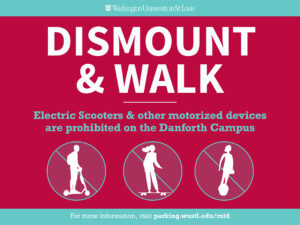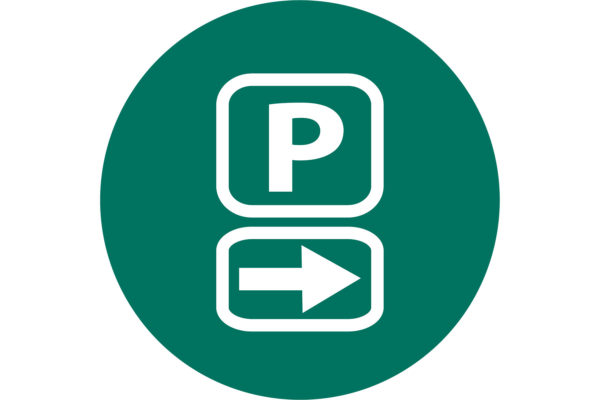 In an effort to support the safety of the Washington University in St. Louis community, electric scooters, motorized skateboards, hoverboards and other motorized transportation devices will no longer be permitted on Danforth Campus sidewalks and pathways as well as on Wrighton Way and Hoyt Drive.
In an effort to support the safety of the Washington University in St. Louis community, electric scooters, motorized skateboards, hoverboards and other motorized transportation devices will no longer be permitted on Danforth Campus sidewalks and pathways as well as on Wrighton Way and Hoyt Drive.
Riders may use scooters and other devices on Wallace, Shepley, Snow Way and Throop drives.
When not in use, scooters and other devices must be parked upright, near a bike rack and away from sidewalks.
Bruce Backus, assistant vice chancellor for the Office of Environmental Health & Safety, said the new policy will reduce accidents on campus. In the past year, 16 e-scooter and e-skateboard riders were injured on campus, according to the Washington University Police Department. In contrast, there are five or six bicycle accidents per year, not all of which result in an injury.
“The safety of our students always is our Number One priority,” Backus said. “This policy helps ensure campus safety while recognizing the convenience offered by e-scooters and other devices.”
The policy applies to the Danforth, North, South and West campuses. The School of Medicine will announce its policy later.
In addition, riders must obey the following regulations:
- Wear a helmet.
- Follow all local ordinances and rules of the road — including obeying traffic lights and riding with the direction of traffic.
- Yield the right-of-way to pedestrians and give an audible signal before passing a pedestrian or cyclist.
- Do not use earbuds in both ears.
- Do not ride with a passenger.
- Ride at a reasonable speed.
- Do not ride a scooter at dusk or in the evening without a front-facing white light and a rear-facing red reflector or red light.
The policy follows a comprehensive review of guidelines at universities and cities across the nation. Backus also consulted with emergency medicine experts at the School of Medicine. They report that one of every five scooter injuries requires hospitalization. They also found that few riders wear helmets.
In addition, the new policy prohibits university employees from using scooters or other motorized transportation devices during work hours while conducting university-related business.
Students who own a personal scooter may not charge it on campus; charging a motorized device in residence halls or academic buildings could cause a fire. E-scooter owners must register their device at Project 529.
Backus said the university will review the policy annually.
“The technology will evolve and the devices will become safer,” Backus said. “But for now, these measures balance our need for safety with the transportation preferences of our community.”
Visit the parking website for more information.


